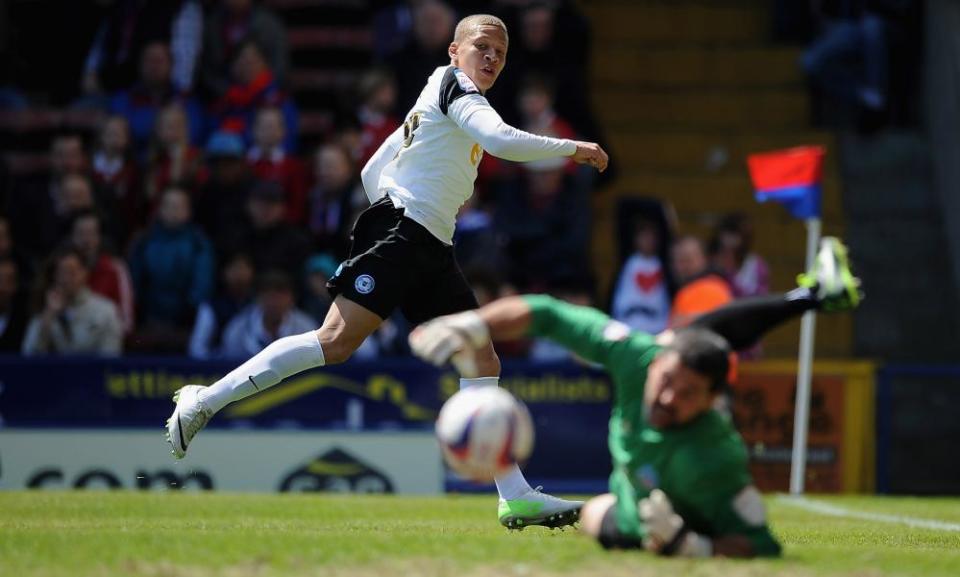Prudent Peterborough profiting from their Posh talent agency

A quick tot-up of reported transfer fees suggests that, over the past 10 years, Peterborough have made a profit of about £21m from player sales. Not bad for a League One club. But Barry Fry, the club’s director of football, bristles. “Nah, we’ve made about £50m.” That’s us told.
The idea of a Football League club developing talent then selling it on as a method of financial survival is not a new or novel one. But Peterborough have got it down to a fine art, managing to run things in a way others may want to but doing it much better.
The list of players that Peterborough have discovered then sold for many times more than they cost is fairly remarkable. Dwight Gayle, George Boyd, Russell Martin, Britt Assombalonga, Conor Washington, Lee Tomlin and Craig Mackail-Smith have all emerged from obscure parts, usually non-league football, passing through London Road on their way to bigger and richer things, part of a reciprocal agreement that helps out both them and the club.
“When we sign players, we say: ‘You’re not going to make a fortune with us but if you use us as a stepping stone then you can become millionaires,’” says Fry. “I think that’s why we get players – we’ve got a history of not standing in their way.”
Peterborough, to an extent, are part football club, part talent agency, digging players from the rough turf of non-league and allowing them to be inspected by those with fatter bank accounts. “We put players in the shop window,” Fry says. “We take gambles, but so far it’s been very successful.”
Quite so. Mackail-Smith cost £125,000 and was sold to Brighton for £2.5m. Washington arrived for £150,000 and went to QPR for £2.7m. Assombalonga was a lavish purchase by their standards, costing £1.25m, but was sold 11 months later to Nottingham Forest for an initial £5.5m. Gayle is the one that gives Fry the most satisfaction, signed for £470,000 from Dagenham & Redbridge, then sold for what would eventually be £7.5m to Crystal Palace, 13 goals and seven months later.
Fry estimates he drives around 70,000 miles a year scouting players, based on tips from anyone and everyone. If he likes the look of a player, their signing has to be approved by the chairman, Darragh MacAnthony, and the manager, Grant McCann. The various managers Peterborough have employed over the years have to be on board with the grand plan, “otherwise they don’t last long”. The immediate needs of the team and the business are treated with equal importance: in theory a player performing well will make the team better and then make them some money.
This is not an altruistic provision for the rest of football, a sort of vetting service for non-league talent. Fry is now a businessman as much as anything, rattling off figures, details of add-ons and assorted clauses, because he has to. “We make a loss every year,” Fry says. “If we budget to lose £3m, and the chairman says he’ll put £1.5m in, it’s my job to find the other £1.5m by selling players. When we sell a player, we put clauses in for £10,000 a game up to a £1m, or in the Premier League £20,000 up to £2m.” Throw in sell-on clauses and you can see why so much money comes in.
It is not a particularly romantic way of doing things, rather a pragmatic one, dictated by the realities of being a club Peterborough’s size, and one that many other clubs aspire to but do not manage.
So what are Posh doing that other clubs are not? An unquantifiable eye for talent, combined with taking risks that others might not, seems to be the answer. “I definitely believe there are players in non-league that are good enough,” says Fry. “We want young, hungry players that want to listen and learn. Non-league players are more hungry and they just want the opportunity. As a club we give them the opportunity.”
The young midfielder Leo Da Silva Lopes and the winger Marcus Maddison are the next likely to depart, and Fry, ever the salesman, is keen to make clear that there is plenty of interest in both. “Long may it continue,” he says.

 Yahoo Sport
Yahoo Sport 





































